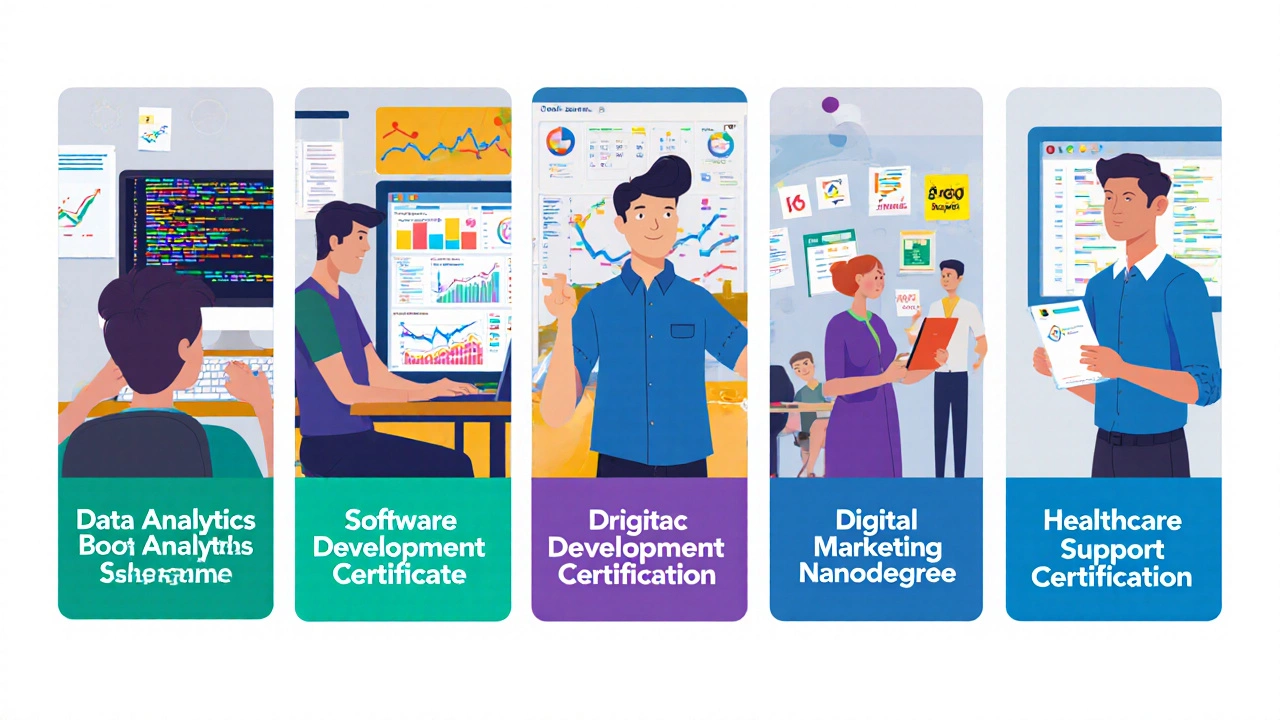Course ROI Calculator
Calculate Your Course ROI
Enter your expected salary and time commitment to see which job-ready course offers the best return on investment based on 2025 UK data.
Key Takeaways
- Focus on industries that are hiring fast and pay well.
- Choose courses with strong employer partnerships and proven placement rates.
- Balance cost, duration, and credential value to maximize ROI.
- Hands‑on projects and internships boost your employability.
- Keep learning; many successful careers start with a short, targeted course.
When you ask, "Which course is best for getting a job?" you’re really looking for a proven pathway from classroom to paycheck. The good news is that in 2025 there are several clear‑cut options that line up with market demand, offer solid credentials, and give you a realistic chance at a steady income.
Job‑ready courses are short‑to‑mid‑length training programs designed specifically to equip learners with the skills employers need right now. They usually end with a recognized certificate or badge, include hands‑on labs, and often come with a built‑in job‑placement service.
How to Pick the Right Course for Your Goal
- Identify the industry you want to break into. Look at regional hiring trends, salary reports, and growth forecasts. In the UK, tech, digital marketing, healthcare support, and skilled trades still dominate the fast‑hire list.
- Check the credential’s reputation. Employers care about accreditation, industry endorsements, and whether the certificate appears on professional bodies’ preferred‑list.
- Measure cost vs. return. Calculate the median post‑completion salary and estimate how long it will take to recoup tuition.
- Look for built‑in work experience. Internships, live projects, or apprenticeship links are huge pluses.
- Consider your learning style. Full‑time bootcamps, part‑time evenings, or self‑paced online tracks each suit different life situations.

Top Five Course Types That Consistently Deliver Jobs
Below are the most reliable pathways, each backed by recent UK employment data (Office for National Statistics 2024). The first mention of every course includes schema markup so search engines can recognize the entities.
Data Analytics Bootcamp is an intensive 12‑week program that teaches SQL, Python, and visualization tools. Graduates often land junior analyst or reporting roles, with a median salary of £35k and an 88% employment rate within three months.
Software Development Certificate focuses on full‑stack JavaScript, version control, and agile practices. The credential is recognized by major tech firms in London, Manchester, and Edinburgh, leading to starter salaries near £42k.
Project Management Professional (PMP) Certification validates your ability to run projects across sectors. According to PMI’s 2024 salary survey, PMP‑holders in the UK earn on average £55k, and the certification boasts a 91% placement rate when paired with a real‑world case study portfolio.
Digital Marketing Nanodegree covers SEO, paid media, and analytics platforms like Google Ads. Graduates typically start as marketing assistants or campaign managers, earning £30k‑£38k.
Healthcare Support Certification prepares you for roles such as care assistant or medical records clerk. The NHS and private providers report a 95% hiring rate for candidates with the Level 3 certificate.
Comparison Table: Quick Look at Cost, Duration, and ROI
| Course | Duration | Typical Cost (GBP) | Median Salary After Completion | Employment Rate (3mo) | Typical Entry Role |
|---|---|---|---|---|---|
| Data Analytics Bootcamp | 12 weeks | £4,500 | £35,000 | 88% | Junior Analyst |
| Software Development Certificate | 24 weeks (part‑time) | £6,800 | £42,000 | 85% | Junior Developer |
| PMP Certification | 8 weeks intensive | £2,900 | £55,000 | 91% | Project Coordinator |
| Digital Marketing Nanodegree | 10 weeks | £3,200 | £33,000 | 80% | Marketing Assistant |
| Healthcare Support Certification | 14 weeks | £2,100 | £28,000 | 95% | Care Assistant |
Step‑by‑Step: Enrolling in Your Chosen Course
- Visit the provider’s website and locate the course landing page.
- Check entry requirements - most courses need a high school diploma or equivalent; some accept relevant work experience instead.
- Request a free information pack or attend a virtual open‑day to gauge teaching style.
- Apply online; you’ll usually need to upload a CV and a brief statement of purpose.
- If financing is a concern, explore government‑backed apprenticeships, student loans, or income‑share agreements.
- Once accepted, set up a dedicated study space, schedule weekly goals, and book any required pre‑course assessments.
- After completion, leverage the provider’s career services - resume reviews, mock interviews, and employer networking events.

Common Pitfalls and How to Avoid Them
- Choosing based only on price. Cheap courses often lack industry partners, leaving you with a certificate but no foot in the door.
- Ignoring accreditation. Verify that the credential is listed by professional bodies such as BCS, PMI, or the Chartered Institute of Marketing.
- Skipping hands‑on projects. Employers want a portfolio. If a program doesn’t include real‑world case studies, look elsewhere.
- Under‑estimating time commitment. Part‑time learners must balance work and study; make a realistic weekly schedule before you sign up.
Next Steps: Tailor Your Path to Your Life Situation
If you’re a recent graduate, a tech‑focused bootcamp might give you the fastest entry. If you’re switching careers mid‑life, a PMP or healthcare support certification pairs well with existing soft skills. For those juggling a full‑time job, look for evening or self‑paced courses that still provide a strong project component.
Remember, the best course isn’t the one with the flashiest marketing copy - it’s the one that aligns with market demand, offers verifiable outcomes, and fits your personal constraints.
Frequently Asked Questions
How long does it usually take to find a job after finishing a job‑ready course?
Most providers report an average placement window of 6‑12 weeks, assuming you actively use their career services and tailor your CV to the target role.
Are there any government subsidies for these courses in the UK?
Yes. The UK’s Advanced Learner Loan scheme covers many accredited certificates up to £5,000. Additionally, the Apprenticeship Levy funds fully‑sponsored programmes for eligible adults.
Do employers really trust short‑term certificates?
When a certificate is backed by a reputable provider and includes a demonstrable portfolio (code repo, campaign report, case study), hiring managers treat it similar to a diploma, especially for junior positions.
What if I fail the final exam or project?
Most programs offer retake options or a remediation period. Check the refund policy before enrolling; some providers allow you to complete the course at a reduced fee if you need extra support.
Can I stack multiple certificates for a higher salary?
Absolutely. Combining a technical skill (e.g., software development) with a project‑management credential often pushes salaries 10‑15% higher because you can lead teams as well as code.





Write a comment